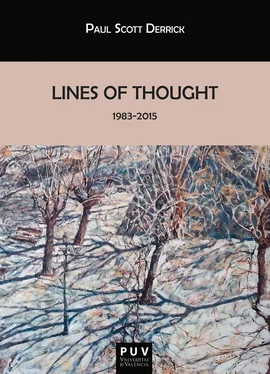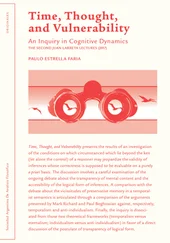Paul Scott Derrick Grisanti - Lines of Thought
Здесь есть возможность читать онлайн «Paul Scott Derrick Grisanti - Lines of Thought» — ознакомительный отрывок электронной книги совершенно бесплатно, а после прочтения отрывка купить полную версию. В некоторых случаях можно слушать аудио, скачать через торрент в формате fb2 и присутствует краткое содержание. Жанр: unrecognised, на английском языке. Описание произведения, (предисловие) а так же отзывы посетителей доступны на портале библиотеки ЛибКат.
- Название:Lines of Thought
- Автор:
- Жанр:
- Год:неизвестен
- ISBN:нет данных
- Рейтинг книги:4 / 5. Голосов: 1
-
Избранное:Добавить в избранное
- Отзывы:
-
Ваша оценка:
- 80
- 1
- 2
- 3
- 4
- 5
Lines of Thought: краткое содержание, описание и аннотация
Предлагаем к чтению аннотацию, описание, краткое содержание или предисловие (зависит от того, что написал сам автор книги «Lines of Thought»). Если вы не нашли необходимую информацию о книге — напишите в комментариях, мы постараемся отыскать её.
Lines of Thought — читать онлайн ознакомительный отрывок
Ниже представлен текст книги, разбитый по страницам. Система сохранения места последней прочитанной страницы, позволяет с удобством читать онлайн бесплатно книгу «Lines of Thought», без необходимости каждый раз заново искать на чём Вы остановились. Поставьте закладку, и сможете в любой момент перейти на страницу, на которой закончили чтение.
Интервал:
Закладка:
But maybe the solution to this problem lies, as so many solutions do, in posing the question differently. How can we, as literature teachers, help a mind to grow into itself, as opposed to the rather easier temptation to force a mind to become what we think it should be?
I would suggest, in the first place, that we must not be afraid of not being in control. We must not let ourselves be deluded into believing that we have to dominate the educational process through statistics and data, nor that we should dominate the student through a mastery of indiscutable facts. This kind of an approach closes the mind rather than opening it. It turns the teacher into a pedant—a transmitter of data—and it turns the student into a bookworm—a memorizer of those same data—or, as Emerson puts it, “the parrot of other men’s thinking.”
On the other hand, if you will permit me a small digression here, I’m not advocating that we necessarily go as far in this direction as Amos Bronson Alcott did in his own quite curious, and ill-fated, experiment in Transcendental education at the Temple School in Boston. Alcott, whose greatest claim to recognition for us today is probably the fact that he sired Louisa May, is a quintessential example of the kind of eccentric figures that Emerson inevitably attracted into his circle.
Basing his whole pedagogical approach—and reputation—on the kind of ideas I am talking about here, this incurable idealist and incorrigible egotist dedicated his school to teaching religion, including some highly complex theological concepts, to children, mostly under the age of 10, simply by conversing with them, by delicately asking them what they thought about various passages from the Bible, or from poetry, that they read together. He himself described the experiment as
[...] a course of conversation with children, on the Life of Christ, as recorded in the Gospels [...] an attempt to unfold the Idea of Spirit from the Consciousness of Childhood; and to trace its Intellectual and Corporeal Relations; its Temptations and Disciplines; its Struggles and Conquests, while in the Flesh. To this end, the character of Jesus has been presented to the consideration of the children, as the brightest Symbol of Spirit; and they have been encouraged to express their views regarding it. The Conductor of these Conversations has reverently explored their consciousness, for the testimony which it might furnish in favor of the truth of Christianity. (Miller 1956: 152)
His assistant in this noble enterprise was Elizabeth Palmer Peabody, the sister of Sophia, who married Nathaniel Hawthorne, and of Mary, who married Horace Mann. Peabody would later become the publisher of The Dial and would go on to found the first American kindergarten in 1860. And interestingly, when Peabody left the Temple School, her place was taken by none other than Margaret Fuller.
In an attempt to raise interest in their efforts, Peabody published her Record of a School in 1835 (with a revised edition in 1836) and Alcott published his grandiloquently titled Record of Conversations on the Gospels Held in Mr. Alcott’s School, Unfolding the Doctrine and Discipline of Human Culture at the end of 1836.
Unfortunately, middle-class public opinion, as represented by the Boston newspapers, was not prepared to appreciate Alcott’s ethereal intentions. He was referred to as a “visionary pedagogue” and a “blockhead” who encouraged ignorant children to express their crude opinions on “the most solemn of all subjects—the fundamental truths of religion as recorded in the Gospels of our Savior.” Emerson sympathized with Alcott and supported him, but as always, the power of the establishment was too strong. The final blow was struck by Andrews Norton, Dexter Professor of Sacred Literature at Harvard University, the same Andrews Norton who so strongly opposed the ideas Emerson was later to express in his “Divinity School Address.” Norton opined, in the Boston Courier , that a third of Alcott’s book was absurd, another third blasphemous, and the rest obscene.
The Temple School would never recover. Alcott gradually lost his students, moved to a cheaper location and finally, by the middle of 1837, had to close down shop completely. 2
Maybe he went too far in pursuing his Romantic conviction that “the child is father to the man” and that innocent children have a more immediate access to the inherent wisdom that we adults, in the process of growing up, almost inevitably “unlearn.” He probably could’ve been more cautious and tactful, and shouldn’t have been so blind to the realities of the world he lived in. But this whole fascinating and very American incident is only one more illustration of the point I am trying to make.
Only when we open our own minds will we be able to open the minds of our students. If we need to learn to relinquish control, an important part of that relinquishment may lie in renouncing any definite goals or objectives for the classroom and in placing the emphasis on intellectual and emotional enrichment rather than the transmission of a pre-determined body of facts. And this is especially true in our case, the case of the study of literature. We are doing our students a grave disservice if we teach them to approach their studies with that terrible thought in mind: “What do I need to know about this to pass the exam?” Much rather, we should be teaching them to inquire: “What can I learn from this for the betterment of my own life?” After all, what is literature if not a collective body of deep reflections on the manifest truths of human experience?
At the worst, we can teach them names and dates and movements—to memorize, parrot and forget. At the best, we can open their minds to the deepest potentials of the works we read together—potentials that we teachers may not even be aware of.
But what kind of test can measure those effects?
Clearly, mine is not a very scientific or rational approach to education. But I hope it is, above all, a human one, and a humanly responsible one. Literature is life. If we are conscientious, skillful and lucky, then we may just be able to plant a few seeds in our students’ minds. Who can tell how those seeds may grow, how fast they may grow, or when they will bear fruit? I know, for example, that I am still learning, 25 or 30 years later, from things that certain teachers of mine said or did in the classroom and which I did not fully comprehend at the time. They were the ones, I now reflect, who really did know what they were doing.
As Emerson implies throughout “The American Scholar,” all of us are students, all of our lives, in this existential learning-place which is the world. The only authentic final exam is how well we manage to formulate ourselves and, in so doing, positively contribute to the world we live in. The great American modernist poet, Marianne Moore, meditates on all of these Emersonian concepts in her aptlytitled poem, “The Student”:
[. . .]
and here also as
in France or Oxford, study is beset with
dangers—with bookworms, mildews,
and complaisancies. But someone in New
England has known enough to say
the student is patience personified,
is a variety
of hero, “patient
of neglect and of reproach”—who can “hold by
himself.” You can’t beat hens to
make them lay. Wolf’s wool is the best of wool,
but it cannot be sheared because
the wolf will not comply. With knowledge as
with the wolf’s surliness,
the student studies
voluntarily, refusing to be less
than individual.
If we dedicate our lives to studying a literature, shouldn’t we take it seriously enough to try to put the ideas it contains into practice?
Literature is life. At a time when we are so obsessed with theory, when teaching methodology has come to be confused with the serious and neverending task of learning, I find myself in the uncomfortable position of believing that teaching and learning are basically a question of establishing clear human relationships, and that the teacher-student relationship is ultimately only a question of one human being talking to others (and, in the happiest case, those others responding)—a question of shared experiences.
Читать дальшеИнтервал:
Закладка:
Похожие книги на «Lines of Thought»
Представляем Вашему вниманию похожие книги на «Lines of Thought» списком для выбора. Мы отобрали схожую по названию и смыслу литературу в надежде предоставить читателям больше вариантов отыскать новые, интересные, ещё непрочитанные произведения.
Обсуждение, отзывы о книге «Lines of Thought» и просто собственные мнения читателей. Оставьте ваши комментарии, напишите, что Вы думаете о произведении, его смысле или главных героях. Укажите что конкретно понравилось, а что нет, и почему Вы так считаете.












